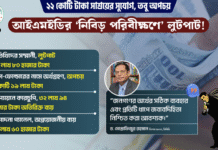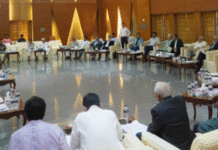
Foreign diplomats come out of state guest house Padma after attending a briefing on the Rohingya crisis hosted by foreign minister AH Mahmood Ali in the capital on Monday. — Ali Hossain Mintu
Bangladesh on Monday urged the international community for maintaining momentum in their engagement for a peaceful solution to the humanitarian crisis involving the ethnic minority Rohingya community as influx from Rakhine of Myanmar continued for about seven weeks.
In a diplomatic briefing in Dhaka, foreign minister AH Mahmood Ali said that to make the bilateral process productive to solve the Rohingya crisis, ‘the international community must keep its discourse alive until a logical conclusion is found.’
He said that the government was dismayed, as atrocities in Rakhine state was not stopped and influx continued relentlessly exposing human sufferings.
Ambassadors, high commissioners and mission chiefs of 28 countries were present in the briefing.
The foreign minister informed the diplomats that Myanmar minister Kyaw Tint Swe, during his visit in Dhaka on October 2, expressed willingness to take back ‘displaced residents’ who entered Bangladesh since October 9, 2016, following the principle and criteria of a bilateral joint statement agreed in 1992 .
He said that the situation of 1992 and the current situation were entirely different as about half of the Rohingya villages in northern Rakhine had been burned down and the burning was still going on. So, identification of Rohingyas based on their residence in Rakhine would not be realistic.
Principles and criteria mentioned in the 1992 joint statement must be revised to address the new realities and current challenges, he said, as burning down of houses and evidences of nationality would extremely affect the process of verification of prospective returnees.
Bangladesh proposed a new arrangement to resolve the crisis and handed over a draft of an agreement to the Myanmar minister outlining the principles and criteria for repatriation, Mahmood said.
Principles outlined in 1978-79 and 1992-93 joint instruments might be considered as reference and provisions should be adjusted according to current realities, he said.
There would be no limit of numbers so long Myanmar nationals could provide proof of residence through evidence and information, he said, adding that they must be allowed to return regardless of when they took shelter in Bangladesh.
There should be joint verification of evidence and information with UN monitoring, he said.
Returnees should be settled in their respective original places of abode, and not in camps meant for internally displaced people, the minister said, adding that recommendations made in the final report of the Kofi Annan commission must be implemented.
Returnees should not be criminalised for their forced exit to Bangladesh, unless they are involved in specific criminal activities, he said.
Response from Myanmar on the proposed arrangement ‘is awaited’, he said, adding that the two countries agreed to form a joint working group in this regard.
Over 5,19,000 Rohingyas, mostly women, children and aged people, entered Bangladesh fleeing violence in Rahkhine, what the United Nations denounced as ethnic cleansing till Sunday beginning from August 25.
The new influx raised the number of undocumented Myanmar nationals and registered refugees in Bangladesh to over 9,37,000, according to UN agencies’ estimate.
The foreign minister also briefed reporters about the exchanges made in the diplomatic briefing.
State minister for foreign affairs M Shahriar Alam and foreign secretary M Shahidul Islam, ambassadors, high commissioners and heads of missions of the United Kingdom, the United States, France, China, Russia, Japan, Egypt, Sweden, Italy, Germany, Netherlands, Denmark, Spain, Switzerland, Norway, the European Union, India, Australia, Canada, Myanmar, Thailand, Malaysia, Indonesia, among others, were present in the diplomatic briefing.
Source: New Age









